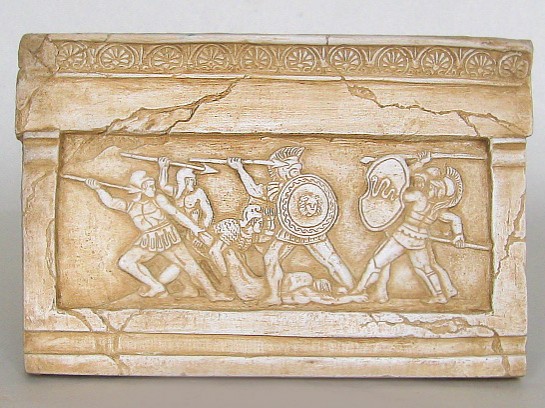The Trojan War was waged, according to legend, against the city of Troy in Asia Minor, by the armies of the Achaeans (Mycenaean Greeks), after Paris of Troy stole Helen from her husband Menelaus, king of Sparta.
The war is among the most important events in Greek mythology and was narrated in many works of Greek literature, of which the two most famous are the Iliad and the Odyssey of Homer.
The Iliad relates a part of the last year of the siege of Troy, while the Odyssey describes the journey home of Odysseus, one of the Achaean leaders. Other parts of the story were narrated in a cycle of epic poems, which has only survived in fragments. Episodes from the war provided material for Greek tragedy and other works of Greek literature, and Roman poets like Virgil and Ovid.
The war sprang from a quarrel between the goddesses Athena, Hera and Aphrodite, after Eris, the goddess of strife and discord, gave them a golden apple marked "for the fairest" (sometimes known as the Apple of Discord). The goddesses went to Paris, who judged that Aphrodite, as the "fairest", should receive the apple.
In exchange, Aphrodite made Helen, the most beautiful of all women, fall in love with Paris, who took her to Troy. Agamemnon, king of Mycenae, and the brother of Helen's husband Menelaus, led an expedition of Achaean troops to Troy and besieged the city for ten years. After the deaths of many heroes, including the Achaeans Achilles and Ajax, and the Trojans Hector and Paris, the city fell to the ruse of the Trojan Horse.
The Achaeans mercilessly slaughtered the Trojans and desecrated the temples, thus earning the gods' wrath. Few of the Achaeans returned to their homes and many founded colonies in distant shores. The Romans later traced their origin to Aeneas, one of the Trojans, who was said to have led the surviving Trojans to Italy.
Ancient Greeks thought the Trojan War to be a historical event. They believed that it took place in the 13th or 12th century BC, and that Troy was located in the vicinity of the Dardanelles, which is in modern day Turkey. By modern times both the war and the city were widely believed to be non-historical. In 1870, however, the German archaeologist Heinrich Schliemann excavated a site in this area which he believed to be the site of Troy, and at least some archaeologists agree.There remains no certain evidence that Homer's Troy ever existed, still less that any of the events of the Trojan War cycle ever took place.
Many scholars would agree that there is a historical core to the tale, though this may simply mean that the Homeric stories are a fusion of various tales of sieges and expeditions by Greeks of the Bronze Age or Mycenean period. Those who believe that the stories of the Trojan War derive from a specific historical conflict usually date it to between 1300 BC and 1200 BC, usually preferring the dates given by Eratosthenes (1194 BC–1184 BC) which roughly correspond with the burning of Troy VIIa.
Product Details
Code: 01506
Dimensions: 13,5x20cm
Colors: White, Black, Brown
